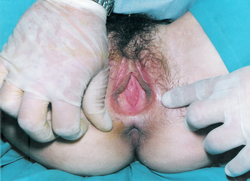Müllerian agenesis
(Redirected from MRKH syndrome)
Editor-In-Chief: Prab R Tumpati, MD
Obesity, Sleep & Internal medicine
Founder, WikiMD Wellnesspedia &
W8MD medical weight loss NYC and sleep center NYC
| Müllerian agenesis | |
|---|---|

| |
| Synonyms | Mayer-Rokitansky-Küster-Hauser syndrome (MRKH) |
| Pronounce | N/A |
| Specialty | N/A |
| Symptoms | Absence of vagina, uterus, and/or cervix |
| Complications | Infertility, sexual dysfunction |
| Onset | Congenital |
| Duration | Lifelong |
| Types | N/A |
| Causes | Unknown, possibly genetic |
| Risks | Family history |
| Diagnosis | Pelvic ultrasound, MRI, laparoscopy |
| Differential diagnosis | Androgen insensitivity syndrome, transverse vaginal septum |
| Prevention | N/A |
| Treatment | Vaginal dilation, surgical creation of a neovagina |
| Medication | N/A |
| Prognosis | Good with treatment |
| Frequency | 1 in 4,500 to 5,000 female births |
| Deaths | N/A |
Müllerian agenesis, also known as Mayer-Rokitansky-Küster-Hauser (MRKH) syndrome, is a congenital condition characterized by the underdevelopment or absence of the uterus and the upper part of the vagina in females, while the external genitalia and the development of secondary sexual characteristics (such as breasts) remain normal. This condition is named after the physicians who first described it: August Franz Joseph Karl Mayer, Carl Freiherr von Rokitansky, Hermann Küster, and G.A. Hauser.
Etiology and Pathogenesis
The exact cause of Müllerian agenesis is unknown, but it is believed to involve a combination of genetic, environmental, and possibly hormonal factors. The condition results from the failure of the Müllerian ducts to develop properly during fetal development. These ducts are precursors to the female reproductive tract, including the fallopian tubes, uterus, cervix, and the upper part of the vagina.
Clinical Presentation
Individuals with Müllerian agenesis typically present with primary amenorrhea, which is the absence of menstruation by the age of 16, despite normal development of secondary sexual characteristics. They may also experience cyclic pelvic pain due to the accumulation of menstrual blood in the vaginal or uterine remnants. Since the ovaries are usually normal, individuals with this condition may experience normal puberty and have a normal female karyotype (46,XX).
Diagnosis
Diagnosis of Müllerian agenesis is often made based on the clinical presentation, including the history of primary amenorrhea and normal secondary sexual characteristic development. Pelvic ultrasound or magnetic resonance imaging (MRI) can confirm the absence or underdevelopment of the uterus and vagina. Karyotyping may be performed to exclude chromosomal abnormalities.
Management
The management of Müllerian agenesis focuses on the psychological and reproductive aspects of the condition. Psychological counseling is important to address any emotional or psychological issues. For those desiring to have a functional vagina, vaginal reconstruction can be performed using various surgical techniques or through non-surgical methods such as the use of vaginal dilators. Assisted reproductive technologies, such as in vitro fertilization (IVF) with a gestational carrier, may be options for individuals wishing to have biological children.
Prognosis
The long-term prognosis for individuals with Müllerian agenesis is generally good, especially with appropriate management of the condition. Psychological support and counseling play a crucial role in helping individuals cope with the diagnosis and its implications.
Epidemiology
Müllerian agenesis is a rare condition, affecting approximately 1 in 4,500 female births. However, the exact prevalence may vary due to underreporting and differences in diagnostic criteria.
See Also
Transform your life with W8MD's budget GLP-1 injections from $125.
W8MD offers a medical weight loss program to lose weight in Philadelphia. Our physician-supervised medical weight loss provides:
- Most insurances accepted or discounted self-pay rates. We will obtain insurance prior authorizations if needed.
- Generic GLP1 weight loss injections from $125 for the starting dose.
- Also offer prescription weight loss medications including Phentermine, Qsymia, Diethylpropion, Contrave etc.
NYC weight loss doctor appointments
Start your NYC weight loss journey today at our NYC medical weight loss and Philadelphia medical weight loss clinics.
- Call 718-946-5500 to lose weight in NYC or for medical weight loss in Philadelphia 215-676-2334.
- Tags:NYC medical weight loss, Philadelphia lose weight Zepbound NYC, Budget GLP1 weight loss injections, Wegovy Philadelphia, Wegovy NYC, Philadelphia medical weight loss, Brookly weight loss and Wegovy NYC
|
WikiMD's Wellness Encyclopedia |
| Let Food Be Thy Medicine Medicine Thy Food - Hippocrates |
Medical Disclaimer: WikiMD is not a substitute for professional medical advice. The information on WikiMD is provided as an information resource only, may be incorrect, outdated or misleading, and is not to be used or relied on for any diagnostic or treatment purposes. Please consult your health care provider before making any healthcare decisions or for guidance about a specific medical condition. WikiMD expressly disclaims responsibility, and shall have no liability, for any damages, loss, injury, or liability whatsoever suffered as a result of your reliance on the information contained in this site. By visiting this site you agree to the foregoing terms and conditions, which may from time to time be changed or supplemented by WikiMD. If you do not agree to the foregoing terms and conditions, you should not enter or use this site. See full disclaimer.
Credits:Most images are courtesy of Wikimedia commons, and templates, categories Wikipedia, licensed under CC BY SA or similar.
Contributors: Prab R. Tumpati, MD


